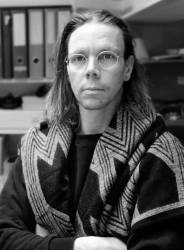Silvia Berger Ziauddin

Silvia Berger Ziauddin is Professor of Swiss and Contemporary History at the Institute of History, University of Bern.
She held teaching and research positions at the University of Zurich, ETH Zurich, the Max Planck Institute for the History of Science in Berlin, the University of Basel and Columbia University, New York City. From 2018–20 she was Assistant Professor of History of the 19th and 20th century at the Historical Institute, University of Bern.
In her PhD thesis, Silvia examined the rise and fall of bacteriology, the leading life science of the late 19th century. Her book Bakterien in Krieg und Frieden (Bacteria in war and peace), published 2009, was awarded the Henry E. Sigerist-Prize and the Förderpreis of the Deutsche Gesellschaft für Geschichte der Medizin, Naturwissenschaft und Technik. Her second book (Habilitation thesis) is a contemporary history of Switzerland told through its civil defence bunkers.
Her research and teaching interests include the history of 20th-century civil defence and bunkerization, the history of the underground since the 19th century, vertical infrastructures and technologies, the cultural history of the nuclear age, historical anthropology of gendered spaces and emotions, and the history of epidemics and infectious diseases from the 19th to the 21st century.
Leo Grob

Leo Grob is a postdoctoral researcher at the Institute of History, University of Bern.
He is also an affiliated researcher in the international partnership program “Deindustrialization and the Politics of our Time (DEPOT)”. His research interests cover the history of labour management and labour and working-class history, the history of the Swiss domestic secret service, the history of deindustrialization, and the history of revolutionary utopias.
He holds a bachelor’s in Sociology from the University of Zurich, and a master’s and PhD in History from the University of Bern. Leo’s PhD Thesis investigates the operations of the multinational corporation Alusuisse in Australia, Italy, and Switzerland in order to unearth insights into the evolution of labour management practices and the dynamic interplay of labour and capital. It was awarded the SWA-Forschungspreis and the Herbert-Steiner-Preis. In the academic year 2018/19 he was a visiting fellow at the University of California, Santa Barbara, and in 2021, a visiting fellow at the University of Zurich. He has received research grants from the Swiss National Science Foundation, the Canton Valais, and the Swiss Social Archive.
Leo Grob’s research currently has two primary focuses: firstly, the history of deindustrialization in Switzerland; and secondly, the history of council democracies and their radical visions since the Paris Commune.